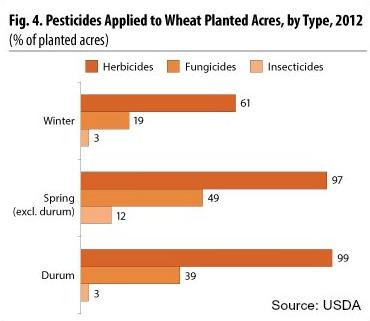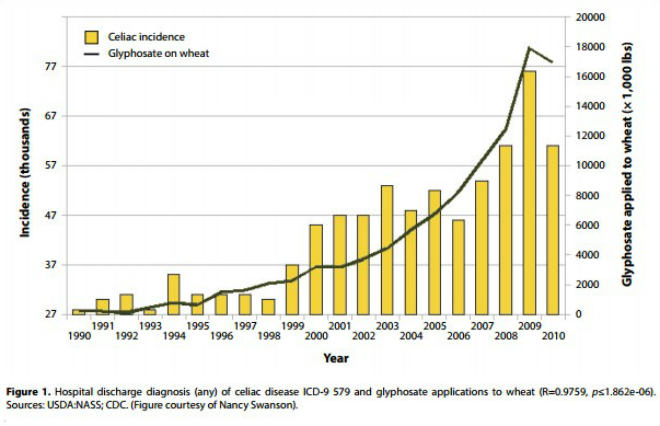There are a growing number of people with digestive problems or allergic reactions to wheat in the US. At the same time, these people don’t have any problems when they are consuming pasta when they are abroad. What is even more shocking is that there are many kids who experience autoimmune reactions when they consume wheat, but not with all wheat they’ve tried.
For instance, many of them don’t have problems when they eat wheat at home and they witness many digestive problems when they take just one roll outside in a restaurant.
It is obvious that there is something wrong with certain wheat and we don’t know what it is. This is not simply a question of non-organic vs organic wheat or hybridization or gluten since there are many cases where ordinary wheat can lead to negative effects.
What’s Wrong with Wheat?
Some experts suggest that the wheat produced in the US is genetically modified. This is a logical explanation for all the odd reactions witnessed by people in North America. These symptoms and signs don’t suggest that wheat hybridization or gluten can cause this.
Namely, wheat hybrids and gluten have been part of people’s diets for millennia. It is not reasonable to expect that these things have made people feel the aforementioned symptoms in the last decade all of a sudden.
In the end, we have figured out the shocking truth about what’s going on with wheat and the answer is closely related to the production process of wheat. It turns out that wheat in the US has not become toxic as a result of GMOs. The main issue is the technique used for harvesting wheat practiced by most wheat farmers in the US.
Namely, US farmers are following a wheat harvest technique that includes soaking fields with Roundup for a few days before they start harvesting. The reason is simple – Roundup kills wheat plants making harvesting simpler, easier, and bigger.
The use of the dangerous Roundup herbicide before harvesting (or a few other herbicides which are loaded with glyphosate) started in the 1980s. However, in the last 15 years, most farmers accepted it as a rule. They usually use it a week or ten days prior to the harvest.
Dr. Stephanie Seneff, who works at MIT, performed thorough research and explained this issue at a recent nutritional conference in the city of Indianapolis. She pointed out that the use of glyphosate-based herbicides before harvest became very popular in the 1990s and today most of the non-organic wheat in the United States is now affected by these herbicides.
Dr. Seneff has pointed out that wheat exposure to toxic compounds like glyphosate leads to increased release of seeds which ultimately means better yield. Wheat plants are dying and they are releasing more seeds during their last moments.
Official statistics from the Department of Agriculture show that just 1% of durum wheat, 3% of spring wheat, and 40% of winter wheat are not treated with herbicides. These figures have doubled since the late 1990s.
According to Snopes, most farmers are using Roundup because this herbicide brings many benefits at least when it comes to harvesting. However, he points out that this is not a licensed practice and there are still many farmers who avoid it.
What is interesting is that this harvesting technique is not used only in the US. For instance, the Food Standard Agency in the UK has reported that as a result of increased use of Roundup, traces of glyphosate are found in many bread varieties. Roundup is used in other countries for this purpose, but some of them have restricted its use or completely banned it (the Netherlands).
While it is true that the use of this herbicide can boost the income of farmers, it is also true that this practice is bad for the health of consumers.
Another thing that is worth mentioning is that the herbicide industry still claims that glyphosate is barely toxic to humans. However, Food Matters shows that glyphosate has a huge impact on mammalian physiology.
This research led by Stephanie Seneff and Anthony Samsel of MIT has shown that glyphosate inhibits P450 enzymes and this element has proven to be very toxic to humans.
At this moment, glyphosate is still not considered to be dangerous for humans and animals. In the past, when Roundup was still trying to win the market, Roundup presenters were drinking sips of this herbicide to show that it is not toxic. But, our body doesn’t react to Roundup right away.
This product slowly disrupts many functions in our body leading to serious health issues. For example, it affects good gut microbes. These microbes, also known as probiotics, are very important for our overall health. Good gut bacteria support the process of digestion, keep the gastrointestinal tract safe, absorb and process vitamins and boost the immune system.
So, Roundup brings negative effects to the work of these good bacteria found in the gut and has a negative effect on the intestinal wall which ultimately leads to the emergence of signs and symptoms of autoimmune disease.
Besides the fact that it disrupts the synthesis of crucial amino acids, glyphosate blocks the P450 enzymes created in the gut microbe. These enzymes are very important to humans because they cleanse the body from a wide range of chemical substances – xenobiotics. Modern people are regularly exposed to xenobiotics.
This means that people who take products with glyphosate via Roundup exposed products like wheat are becoming very vulnerable to the negative effects of some toxins and chemicals found in our environment.
The worst part is that the negative effects of exposure to glyphosate are not quick and it takes months or even years for the body to start showing the typical symptoms. This means that it also takes a lot of time to solve this problem once the first symptoms occur.
Some of the effects of this long-term inflammation are the most common health issues linked to modern lifestyle including:
- Obesity
- Gastrointestinal disorders
- Heart disease
- Diabetes
- Autism
- Depression
- Cancer
- Infertility
- Alzheimer’s disease
- Multiple sclerosis.
To put it simply, according to the scientific study led by Dr. Seneff and focused on glyphosate found in Roundup used in wheat harvesting, this dangerous compound brings negative effects to the human body by blocking the good gut microbes which ultimately results in diseases, disorders, and pain. So, even if you have not noticed any problems, it is a smart idea to stay away from conventional wheat.
Stay Away from Toxic Wheat as Much as You Can
What is important to understand is that staying away from conventional wheat produced in the US is a must even if you are not experiencing gluten sensitivity or allergy at the moment. There is no doubt that the increased number of people suffering from gluten intolerance and celiac disease is closely related to the increased use of glyphosate.
According to Dr. Seneff, the higher number of people suffering from these problems is not strictly genetic and the environment plays a significant role in this occurrence.
The negative impact of dangerous glyphosate on your body is so intense that the absence of signs and symptoms at the moment is irrelevant. In case you don’t have any problems with wheat at the moment, but you will probably have it in the future if you don’t avoid conventional wheat.
Eating Safe Wheat
Logically, in case you already have an allergy or sensitivity to wheat, you are probably avoiding wheat.
However, in case you are not sensitive to gluten or you don’t have celiac disease and you want to consume wheat, you should know that there is a way to take it safely. Try to use completely organic, non-hybridized, low-gluten Einkorn wheat whenever you are preparing cookies, pancakes, bread, etc. If you are eating out or you are buying products from the store, stay away from products that contain wheat.


